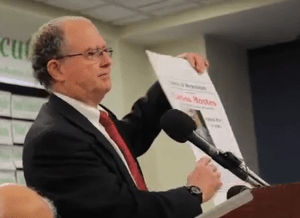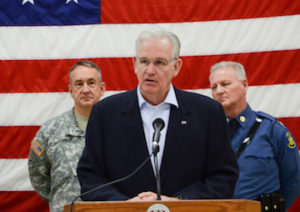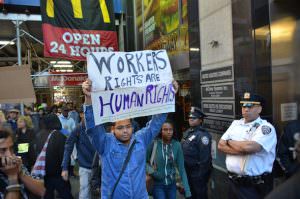Truthdigger of the Week: Stephen F. Downs
It’s safe to assume that Big Brother would still have prevailed over Winston Smith had the ill-fated protagonist of George Orwell’s dystopian novel "1984" been helped by public defender Stephen Downs. But we have reason to believe that Downs, who represents Muslim activists in trials that amount to little more than terrorist witch hunts, would not have backed down.A New York attorney who represents Muslim activists in trials that amount to little more than terrorist witch hunts is our Truthdigger of the Week.
Every week, Truthdig recognizes an individual or group of people who spoke truth to power, blew the whistle or stood up in the face of injustice. See past winners here, and nominate the next awardee here.
It’s safe to assume that Big Brother would still have prevailed over Winston Smith had the ill-fated protagonist of George Orwell’s dystopian novel “1984” been helped by public defender Stephen Downs. But we have reason to believe that Downs, who represents Muslim activists in trials that amount to little more than terrorist witch hunts, would not have backed down.
For six years now, Downs has battled the domestic legal consequences of the Cheney “One Percent” doctrine. The rule states that if there is a 1 percent chance of a suspected terrorist attack against the United States, then the interest of national security demands that the U.S. government treat that chance as an absolute certainty. Former Vice President Dick Cheney justified the idea in a case where the Bush administration claimed Pakistani scientists were helping al-Qaida build an atomic bomb: “If there’s a 1 percent chance that Pakistani scientists are helping al-Qaida build or develop a nuclear weapon, we have to treat it as a certainty in terms of our response. It’s not about our analysis … It’s about our response.”
According to Cheney, such “low-probability, high-impact” events justified the government’s adoption of an aggressive new defense strategy.
Those of us who watched U.S. forces invade Iraq and Afghanistan almost a decade ago know that strategy as pre-emptive war. So far, those wars together have cost the lives of more than 150,000 Iraqi and Afghan civilians and tens of thousands of combatants. But armed conflict is only one consequence of pre-emptive thinking.
As Downs would point out, pre-emptive war has its domestic correlation in what he has termed “pre-emptive prosecution.” This is the act of targeting people on the basis of ethnicity, religion, race, ideology or some other identifying factor that has nothing necessarily to do with criminal conduct, and trying them in a criminal court.
The most recent, well-documented case of pre-emptive prosecution is that of Tarek Mehanna, an American citizen sentenced to 17½ years in prison for aiding al-Qaida and conspiring to kill U.S. soldiers in Iraq. But evidence against Mehanna was scant to nonexistent. As Truthdig columnist Chris Hedges reported earlier this week: “His real ‘crime’ … seems to be viewing and translating jihadi videos online, speaking out against U.S. foreign policy in the Middle East and refusing to become a government informant.”
Mehanna’s conviction suggests the U.S. government is using the threat of terrorism to suppress dissent. In the introduction to a book titled “Victims of America’s Dirty Wars,” published by Project Salam — a website devoted to investigating the likelihood that U.S. officials have falsely convicted American Muslims on charges similar to Mehanna’s — Downs writes: “Today, the U.S. government has launched its own ‘dirty wars’ against citizens whose ideology it wants to repress. People who have committed no crime are taken into custody, isolated without adequate recourse to legal advice, railroaded with fake or contrived charges, and ‘disappeared’ into prisons designed to isolate them.”
In the same book, Downs recounts the history of similar abuses of American minority groups, many of them institutional, and identifies Muslims as only the latest terreur du jour: “Islamophobia is just the latest in a long string of backlashes that have included the COINTELPRO repression by the FBI against Black Power advocates and Vietnam War protesters; Communist witch-hunts; the internment of Japanese-Americans during World War II; anti-Semitism against the Jews; Palmer raids against immigrants and leftists; Jim Crow laws, segregation, and the Ku Klux Klan against African Americans; and many other periods of bigotry against different racial, religious, ethnic, and ideological groups.”
It is known that Muslim-Americans suspected of no crimes have been the subject of secret investigations by the NYPD. But much of the public still regards such abuses as improbable or, when they do occur, irrelevant to their lives. However, the threats to civil liberties are real, Downs says, and the targeting of Muslims today suggests that similar persecution awaits all Americans who find themselves on the wrong side of power tomorrow: “The allegation that the FBI and the Justice Department deliberately create fake or contrived cases against innocent people … may be shocking to some; but in the context of the unconstitutional and illegal activity in which the government has engaged under the guise of fighting the war on terror, fake criminal prosecutions are just one more step.”
For those courageous words, and for his efforts to defend those unjustly charged, Stephen Downs wins our regard and is our Truthdigger of the Week.
Hear Downs lay out his case before an audience of legal scholars in his own voice below.
–Alexander Reed Kelly
Your support matters…
Independent journalism is under threat and overshadowed by heavily funded mainstream media.
You can help level the playing field. Become a member.
Your tax-deductible contribution keeps us digging beneath the headlines to give you thought-provoking, investigative reporting and analysis that unearths what's really happening- without compromise.
Give today to support our courageous, independent journalists.








You need to be a supporter to comment.
There are currently no responses to this article.
Be the first to respond.